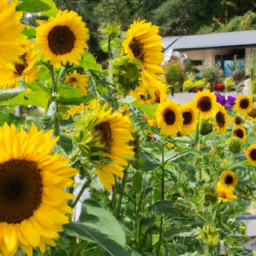Backyard Sunflower Garden Ideas
Backyard Sunflower Garden Ideas
Backyard Sunflower Gardening Ideas for the Avid Enthusiast
What Plants Should I Consider?
For anyone looking to add a colorful splash to their garden, the classic sunflower is a must-have. But with so many varieties on the market, it can be hard to know which one is right for your own backyard. There are a few factors to consider when choosing the best type of sunflower, including bloom time, height, and soil requirements. Each of these traits can help you pick the ideal sunflower for your garden.
Annual vs. Perennial
The majority of sunflower varieties are annuals, which means they will only flower for one season. While annuals often have a burst of blooms that last the entirety of the summer or fall, perennials are typically slower growing, but will return year after year. Perennials are usually shorter in height and have larger blooms than their annual counterparts.
Sun and Soil Requirements
Another important factor to consider when choosing sunflowers is the amount of sun and type of soil they require. All sunflowers need at least six to eight hours of direct sunlight each day, and some varieties may require more. Additionally, most sunflowers thrive in well-drained soil that's slightly on the acidic side. Make sure to check each variety's specific needs before planting.
Planning Your Sunflower Garden
It's also important to consider spacing when planning your sunflower garden. Most sunflower varieties will grow best when they're planted a foot or two apart. Keep in mind the type of sunflowers you've chosen and add appropriate support for the taller varieties. Staked sunflower plants can benefit from extra garden stakes or twine for additional support.
Companion Planting
Companion planting is an age-old method of companion planting vegetables and herbs close together. Similar types of plants are placed near each other so that they can cross-pollinate and create a harmonious garden. Blue Sage, marigolds, and zinnias all make perfect companions to your sunflowers since they will also help attract beneficial pollinators.
Pest Control
Controlling pests is an important part of successful gardening. Fortunately, there are a few simple steps that you can take to keep your sunflower garden healthy. Start by letting the outer leaves of your sunflowers dry out to discourage slugs and snails. You can also push some sharp gravel or sand around the plants to help keep them away. Additionally, consider planting ant-attracting herbs in and around your sunflower garden to help control the insect population.
Now It's Time To Plant!
After you've done the research and plan of your garden, you're all set to start planting! Sunflowers are great for all levels of gardening experience, so don't be afraid to get out there and try growing these vibrant blossoms. Before you know it, your garden will be bursting with color for all to enjoy!
Insights
Whether you're a seasoned gardener or a beginner, sunflower gardening is a fun project that can bring lots of color and joy to your backyard. When planning your sunflower garden, it's important to consider factors such as bloom time, soil type, and companion planting, as well as pest control. With a little planning, you can create a vibrant and healthy sunflower garden in no time.

Previous Page
Next Page
